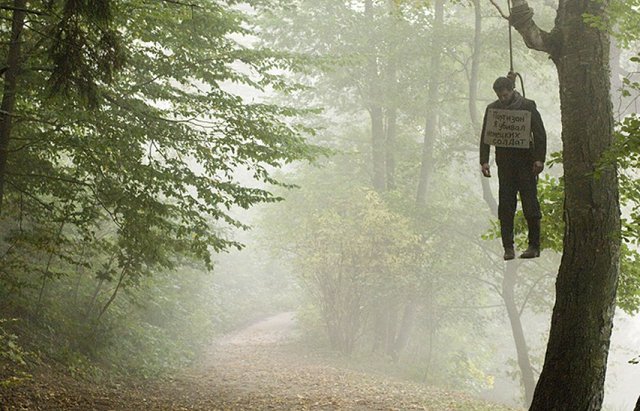
Suicide and its connotation in Japan
Japan is for the Westerners a country with an enigmatic culture that causes admiration and respect. With millenary traditions that have changed little with the passing of time.
The Japanese are mostly synodistic or Buddhist, that is, they believe in kamis or nature spirits. They are not religions, but spiritual philosophies that guide the course of their lives. They do not believe that there is a supreme being that decides and governs the destiny of the people, so for them the concept of Western God is incomprehensible.
Because of this, suicide is not an act of offense against any deity, but an act of honor and courage. This would be the first point to consider in order to understand why this culture solves many times its embarrassing acts or sorrows committing suicide.
The honor for the Japanese, does not admit half measures, is inflexible. It is above life itself. If you do not have the moral courage to respect yourself, you are not worthy of consideration in your society.
Japan is in the 12th position of countries with a suicide rate per 100,000 inhabitants, according to the World Health Organization as you can read in Wikipedia.
Aokigahara or The Sea of Trees
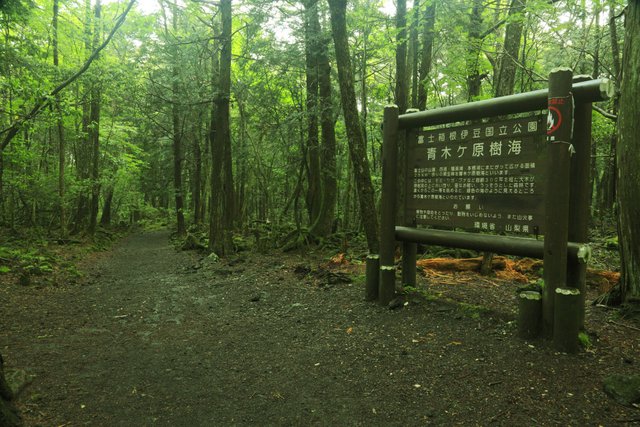
Aokigahara is a thick forest of 35 km2 of centenary trees, so dense in some areas that it limits the circulation of the air and practically does not enter the sunlight. Those who have studied it believe that it is one of the reasons why there is almost no wildlife or bird trills, so the forest is gloomily silent. Among its thickness are underground caves and volcanic formations.
"...The forest at the foot of Mount Fuji is so dense that even on a rainy day, you'll hardly feel a single drop of water fall on you - simply because the canopy is so dense. No matter whether it's raining, snowing, or strong winds are blowing, Aokigahara will protect you and your walking tour from the elements...."
1000 years ago it was already known as The damned forest by its inhabitants, since many of the poems that date from that time speaks of the strange disappearances of people who are never seen again or the mental disturbance that drives them to suicide without apparent reasons.
About this last, some believe that being the volcanic waste forest bed combined with poor air circulation, causes symptoms of poisoning causing people to become disoriented or suffer from hallucinations, losing the way. They even try to explain that the fact that GPS and compasses are useless in the forest responds to the magnetic interferences of the volcanic composition. As a curious fact, those who venture to enter the place, mark the route with ribbons tied to the trees to find the return.
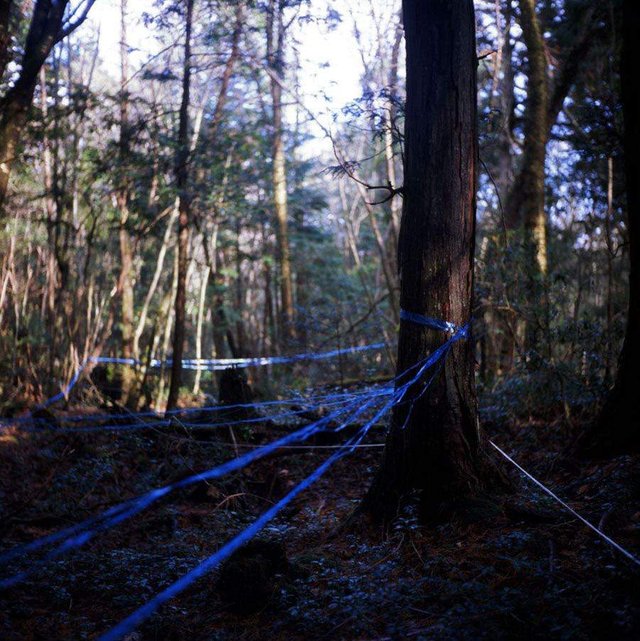
Vengeful spirits?
It is that the Forest of Trees seems to catch those who go into its thicket without precaution. Legend has it that the spirits Yurei or Onryo inhabit in their hearts. Are the spirits of elderly, sick or children who were abandoned to their fate as a result of famine and epidemics that devastated Japan in the seventeenth century. They are spirits that seek revenge and keep the forest charming.
The truth is that every year, forest rangers count approximately one hundred corpses between suicides and people who go missing dying of hunger or trauma. It speaks of corpses with years of antiquity that were so deep in the thicket that only happened to them by chance.
The Japanese government, as a preventive measure, stopped publishing the statistics to try to reduce the morbidity to the forest and discourage those who intend to commit suicide. Even some provinces of Japan consider the book The complete manual of the suicide of Kanzen Jisatsu Manyuaru harmful, because in this the forest is recommended as a perfect place to die, nevertheless its sale is not forbidden.
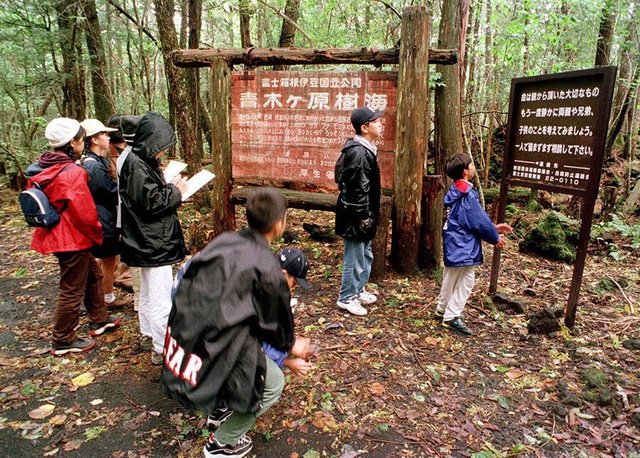
Throughout the park posters have been distributed with dissuasive and reflective messages in the hope that they will reconsider staying alive. Messages like:
"Your life is a beautiful gift from your parents. Please think about your parents, siblings and children. Do not keep it. Talk about your problems "," Do not suffer alone, before, contact someone ".
And is that the peculiar characteristics such as darkness, low temperature, loneliness and overwhelming silence of the Forest of suicides often affect the psyche of visitors.
The best place to die
Every day, park rangers pay attention to cars parked in the park's parking lot that seem abandoned by their owners as the first sign of a possible suicide or loss. But nothing can be done to prevent them from achieving their goal.
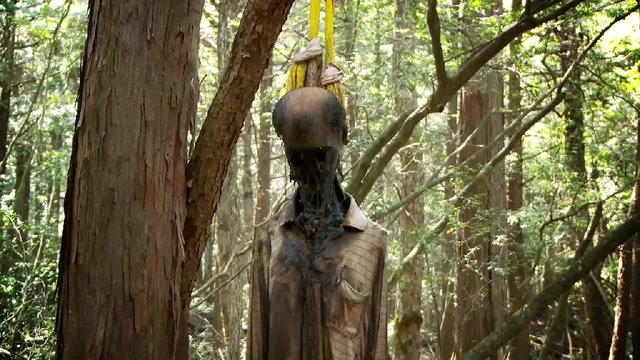
Such is the practice of suicide within the park that every year a group of volunteers scans the forest in search of corpses at the request of people who suspect that their family member may have committed suicide there.
In the tour you can see the reminders that the relatives of the deceased leave in the places where they were found. This probably reinforces the feeling of disillusionment and helplessness that ends up bringing down the unfortunate, who decides to end his grief alone in the most recondite place he can find.
A detail that does not stop surprising is that suicides do not use firearms; just poison, drug overdose or hanging on a tree. Some camp a few days before making the final decision.
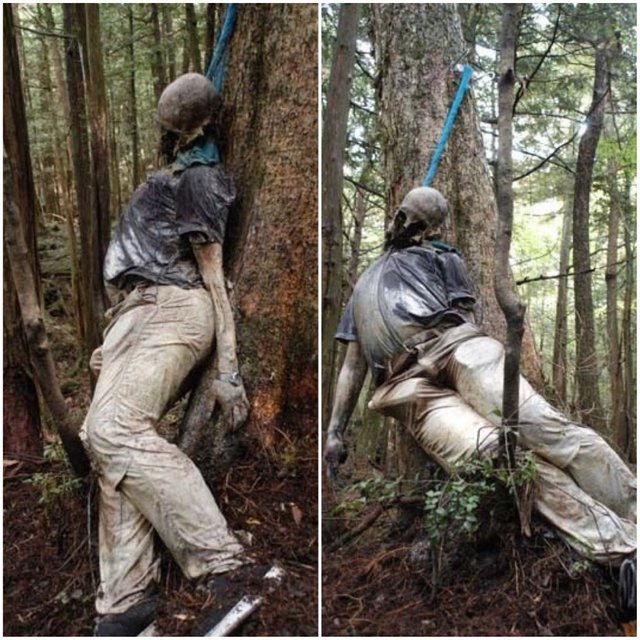
Aokigahara remains a mystery and continues to be the favorite place for the Japanese to end their days. It ranks second in places where suicides occur most. The first is the Golden Gate Bridge in San Francisco, California.
There are many reasons that someone could expose in favor of life, but that is how powerful are the reasons that a suicide poses to die.
Before judging, you have to take a minute to think that only those who commit suicide know how unbearable their suffering was and to know how unbearable it was to be in their shoes, and to be in their shoes you have to live their life with all their circumstances, then, when living their circumstances, you would arrive at the same sad destiny. It can not be different, because it was precisely those circumstances that forced they to make the decision. People make decisions based on their life experience.
In short, you can never be in the shoes of another living the same circumstances and believe that you would find a better option.
Fuente
wikipedia.org
muyinteresante.es
ivejapan.com
actualidadviajes.com
elportaldelmiedo
japansociety.org